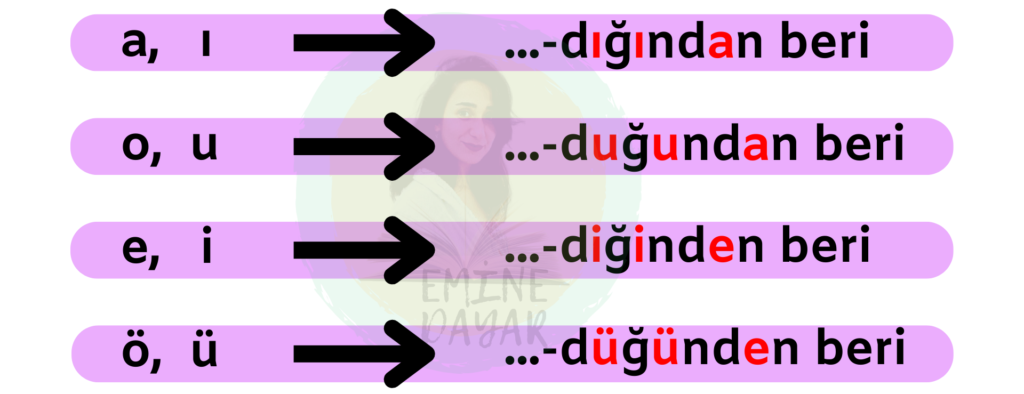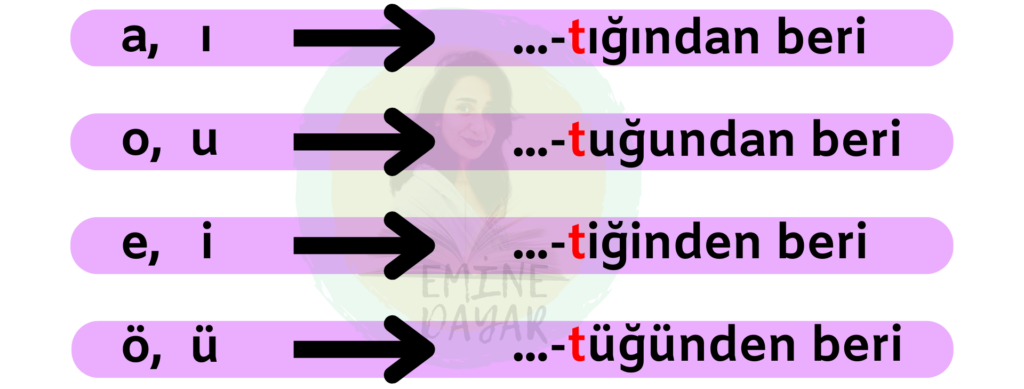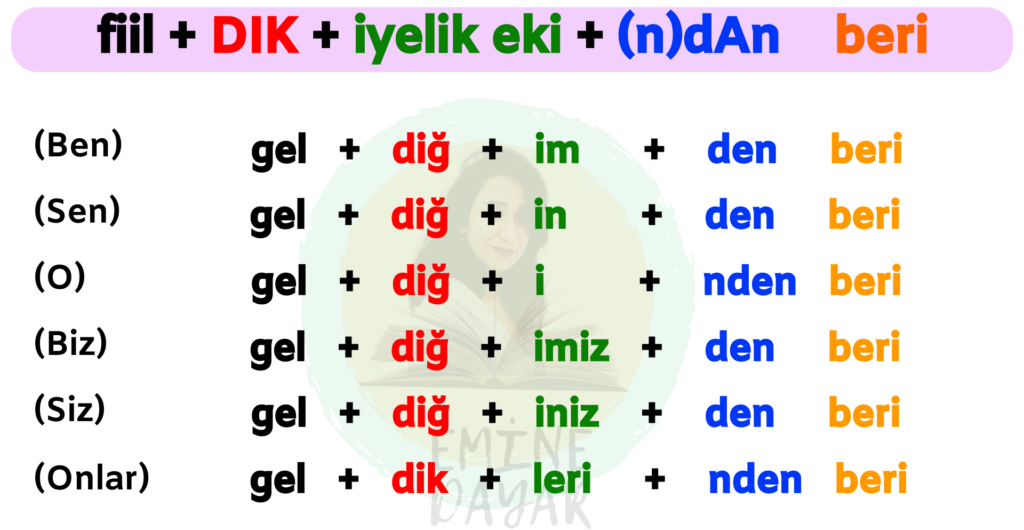-diğinden beri in Turkish (Since in Turkish)
Before starting -diğinden beri in Turkish (since in Turkish language), it would be appropriate to remind you of the -since/-dir structure that you learned in Turkish A1. Briefly; We use -since/-dir after names to indicate when something starts or where it starts. In other words, we understand when the work started and how long it has been done. It also indicates that the work is still in progress. (It started somewhere in the past and still continues.) You can click here to learn or remember this A1 grammar topic in more detail.
Dün akşamdan beri konuşmuyoruz. (Dün akşam konuşmamaya başladık ve hala konuşmuyoruz.)
- We haven’t spoken since last night. (We stopped talking last night and we still don’t.)
Hazirandan beri Türkçe sertifika sınavı için ders çalışıyorum. (Haziranda ders çalışmaya başladım ve hala çalışıyorum.)
- I have been studying for the Turkish certificate exam since June. (I started studying in June and am still studying.)
Starting from what you remember above, let’s move on to today’s topic -diğinden beri. The grammatical structure you will learn in today’s lesson is also used in the same sense. Indicates when a verb started in the past and the verb still continues.
What Is Diffrence Between -den beri and -diğiden beri
As I said, both structures are used in the same sense and for the same task. The difference is this; The structure you learned in A1 (since/-dir) is used with names. But the structure you will learn in this B1 lesson (-diğinden beri) is used with verbs. In other words, if you do not know which suffix to use, you should look at the word that is used at the end of this structure. So whether it’s a noun or a verb, you should look at it!


Example Sentences With -diğinden beri
Spora başladığından beri daha sağlıklı görünüyorsun.
- You look healthier since you started exercising.
Akşamları ekmek yemediğimden beri kilo veriyorum.
- I’m losing weight since I don’t eat bread in the evening.
Sabah evden çıktığından beri dönmedi.
- S/he hasn’t returned since s/he left the house in the morning.
Ona aşık olduğundan beri hareketleri bile değişti.
- Even his/her actions have changed since she/he fell in love with him/her.
Geldiğinizden beri çok mutlu.
- S/he has been very happy since you came.
Onu gördüğümüzden beri bize gülüyor.
- S/he’s been laughing at us ever since we saw him.
Köylüler, güneş doğduğundan beri tarlada çalışıyor.
- Villagers have been working in the fields since sunrise.
Avrupa’dan geldiğinden beri tarzın çok değişti.
- Your style has changed a lot since you came from Europe.
Sigarayı bıraktığından beri daha az öksürüyor.
- S/he has been coughing less since s/he quit smoking.
Yeni eve taşındığımızdan beri hiç arkadaşım
- No friends since we moved into the new house
Mezun olduğumdan beri iş arıyorum ama bulamıyorum.
- I’m looking for a job since I graduated but I can’t find it.
Yeni işe girdiğimden beri gece geç saatlere kadar çalışıyorum.
- I’ve been working late into the night since I got a new job.
Kış geldiğinden beri kalın kıyafetler giyiyoruz.
- We have been wearing thick clothes since winter has come.
Hasta olduğumdan beri eşim benimle daha çok ilgileniyor.
- My wife has been taking care of me more since I was sick.
Ürün fiyatları düştüğünden beri çalışanlar siparişlere yetişemiyorlar.
- Since product prices have decreased, employees have been unable to keep up with orders.
Korona çıktığından beri çoğu insan evde çalışmaya başladı.
- Most people have started working from home since corona.
Toplumca trafik kurallarına dikkat ettiğimizden beri daha az kaza oluyor.
- Since we pay attention to the traffic rules as a society, there are fewer accidents.
Sıcaklıklar düştüğünden beri sürekli hastalanıyorum.
- I’ve been getting sick all the time since the temperatures decreased.
Çantam koptuğundan beri çantamı koluma takamıyorum.
- Since my bag broke, I can’t wear my bag on my arm.
Kursa gittiğimizden beri daha iyi Türkçe konuşuyoruz.
- Since we went to the course, we speak better Turkish.
Sokağa çıkma yasağı çıktığından beri insanlar daha çok depresyona giriyor.
- Since the curfew came into effect, people are getting more depressed.
Rules
1. The first thing you should know is the suffix can be in 4 different form according to vowel harmony. You should check the last vowel of verb and then check the Turkish 4 way vowel harmony.

- kal+dığından beri
- kır+dığından beri
- sor+duğundan beri
- uyu+duğundan beri
- iste+diğinden beri
- sil+diğinden beri
- gör+düğünden beri
- sür+düğünden beri
2. The second thing is check the Turkish consonant harmony! If the last letter of verb is “f, s, t, k, ç, ş, h or p”, you should change the first letter of suffix “d” into “t”.

- kalk+tığından beri
- yap+tığından beri
- git+tiğinden beri
- konuş+tuğundan beri
3. The third thing is how to say a negative verb. You already know that we just use 2 shape of negative suffix (-ma and -me) most of time. Again we use both suffixes (-ma and -me) (Here you should check the 2 way vowel harmony), then write the right suffix (Here you should check the 4 way vowel harmony). But don’t stuck with vowel harmony guys. Just try to understand structure and try to make sentences. You’ll already get used to say right letter in time:)

- sor+madığından beri
- yap+madığından beri
- iste+mediğinden beri
- git+mediğinden beri
4. The fourth things that you should know is checking the subject pronouns! This can makes you confused at first. But the only things you should pay attention is who is making the verb! The verb is about who? And then remember relative suffixes/possesive suffixes (iyelik ekleri). Now you should change the suffix according to these suffixes.

What is Difference Between -diğinden beri and -alı/-eli
You will learn the suffixes -eli/ali in the next lesson. You can also reach the next lesson by clicking here. But if you’ve heard it before and you’re curious about the difference, let’s continue. There is not much difference between them. You can generally use the two interchangeably. But I can talk about the difference in meaning. In the “-diğinden beri” structure, the event started somewhere and still continues, but you especially emphasize the starting point of the event. “-ali, -eli” the event started somewhere and still continues, but you especially emphasize the whole process of the event.
If you have any question about -den beri, -diğinden beri, -eli/alı / since in Turkish / or any subject about Turkish language just let me know in the comment below. Btw we also share all Turkish grammar lessons, some daily usefull tips, Turkish idioms and more about Turkish language and Turkish culture on YouTube channel! You can watch all lessons for free now! and Just click here subscribe to don’t lose our videos. See you in another lesson!
